Salads and sandwiches and snacks are going to get even better with two practically foolproof methods to making my Easy Hard Boiled Eggs recipe! Get ready to ditch the traditional boiling water approach. Using these techniques will ensure your eggs are cooked to perfection every time.
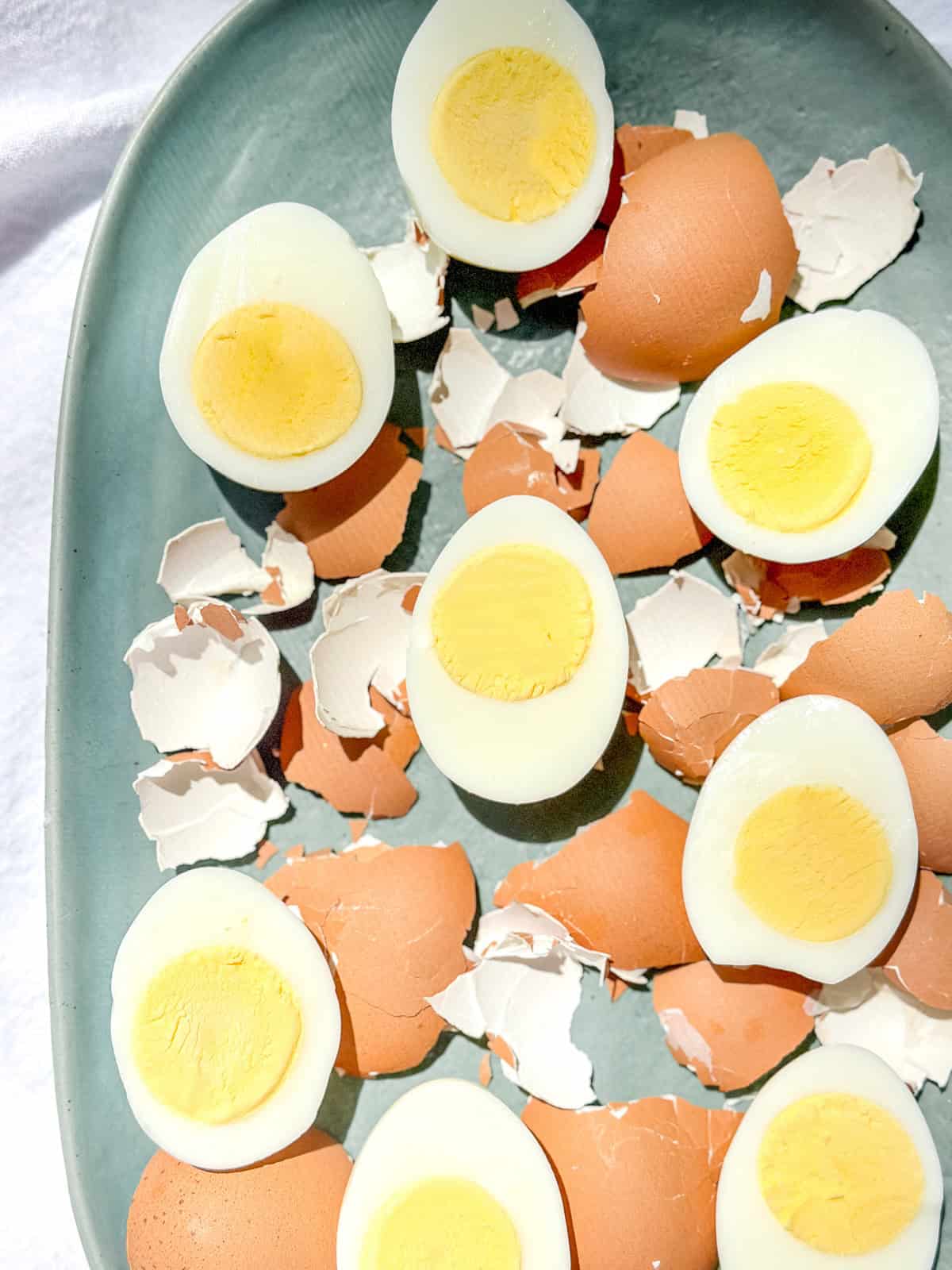
Save This Recipe! 💌
I do not have a good history with hard boiled eggs. I have forgotten my eggs in the boiling water far too many times. Once for 20 minutes 🫠 It wasn't pretty folks. To redeem myself I am bringing you two practically foolproof ways to make Easy Hard Boiled Eggs.
Perfectly cooked, no unsightly green ring around the yolk, no metallic flavor. And are you tired of trying to peel your eggs and losing half of the whites in the process? I got you covered there too! Perfectly cooked eggs, no ugly green ring, no crumbly yolks, and shells that practically peel themselves. Sign me up!
Jump to:
❤️ What you'll love about this recipe
- No boil - I mean hardly boil. Boil the water, take it off the heat, pop in the eggs, cover the pot. That's it. so easy!
- Easy to peel - If you use the steaming method, you can easily peel the eggs because the steam actually penetrates the shell and helps to loosen it from the egg, doing most of the work for you!
- Practically foolproof - As long as you remember to set a timer, you can't mess this up. If you forget you put them in ice water for a hour because you were watching Housewives, you're only human.
Ingredients
Better screenshot this and bring it with you to the mega market. It's so many ingredients.
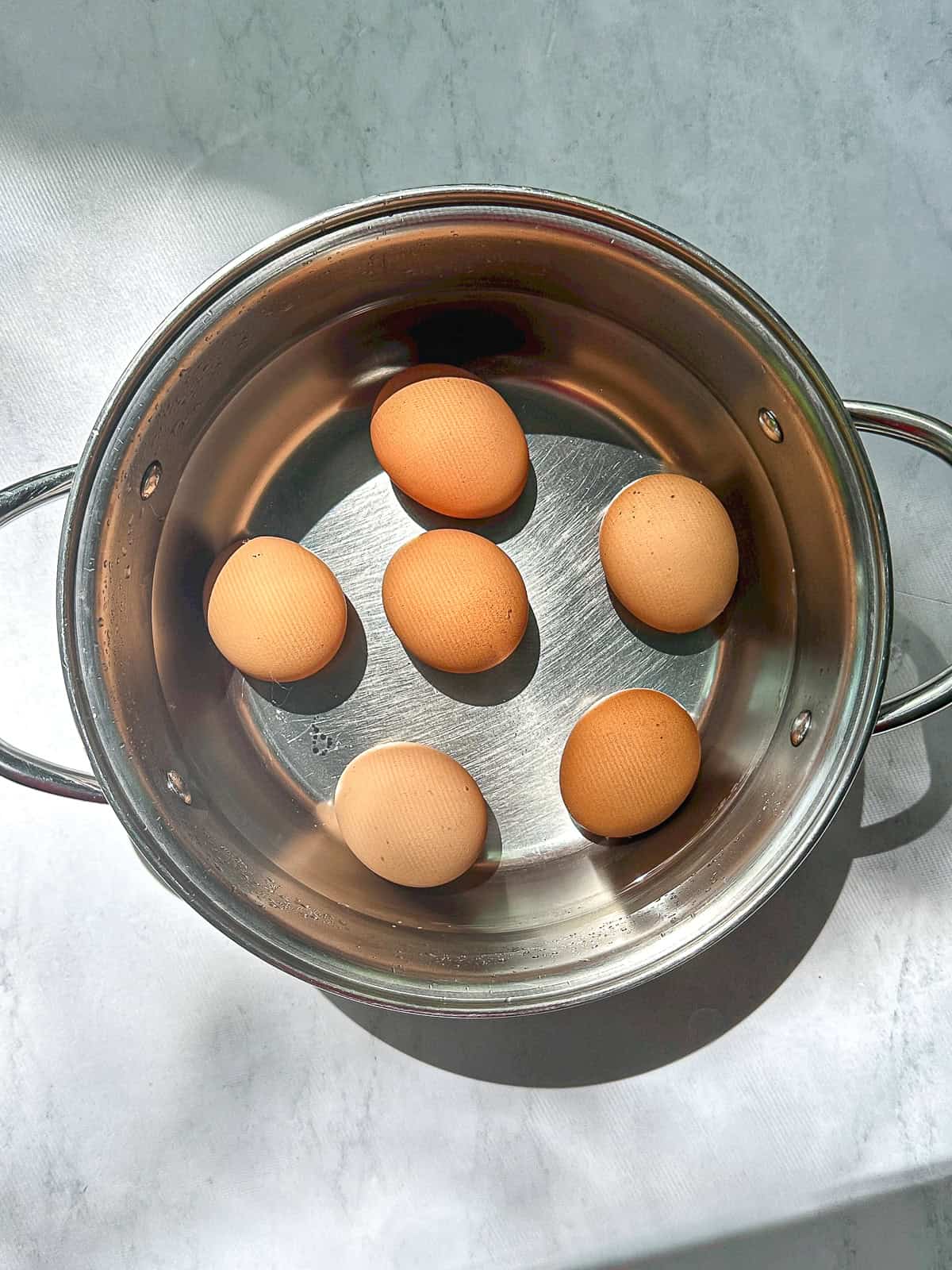
I mean, that's it. Eggs and water. No salt. No vinegar. No baking soda. Eggs and water.
Uses for hard cooked eggs
There's probably no end to the ways you can use hard boiled eggs. Here are a few ideas:
- Deviled eggs - As a proud Southern woman, I can't believe I don't already have a deviled egg recipe on my blog and I plan to fix that immediately after finishing this post!
- New Eggs Benny - I replaced the English Muffin in my Hash Brown Eggs Benedict, but if poached eggs aren't your thing, replace it with a mashed or sliced hard boiled egg!
- Sandwiches - I mean, egg salad sandwiches are a classic for a reason. Use these eggs in your favorite recipe.
- Ramen - Decrease the cook time to 7 to 8 minutes and you have the perfect jammy egg consistency to top your ramen.
- Salads - A cobb salad just isn't a cobb salad without the hard cooked egg. Neither is a Salad Niçoise, but how about a caprese salad with eggs, or a chef's salad? I'm in!
- Avocado Toast - Whether it's a classic avo toast on your choice of bread, or a hash brown avocado toast, it'll be even more delicious and cravable if you chop or grate a hard boiled egg on top!
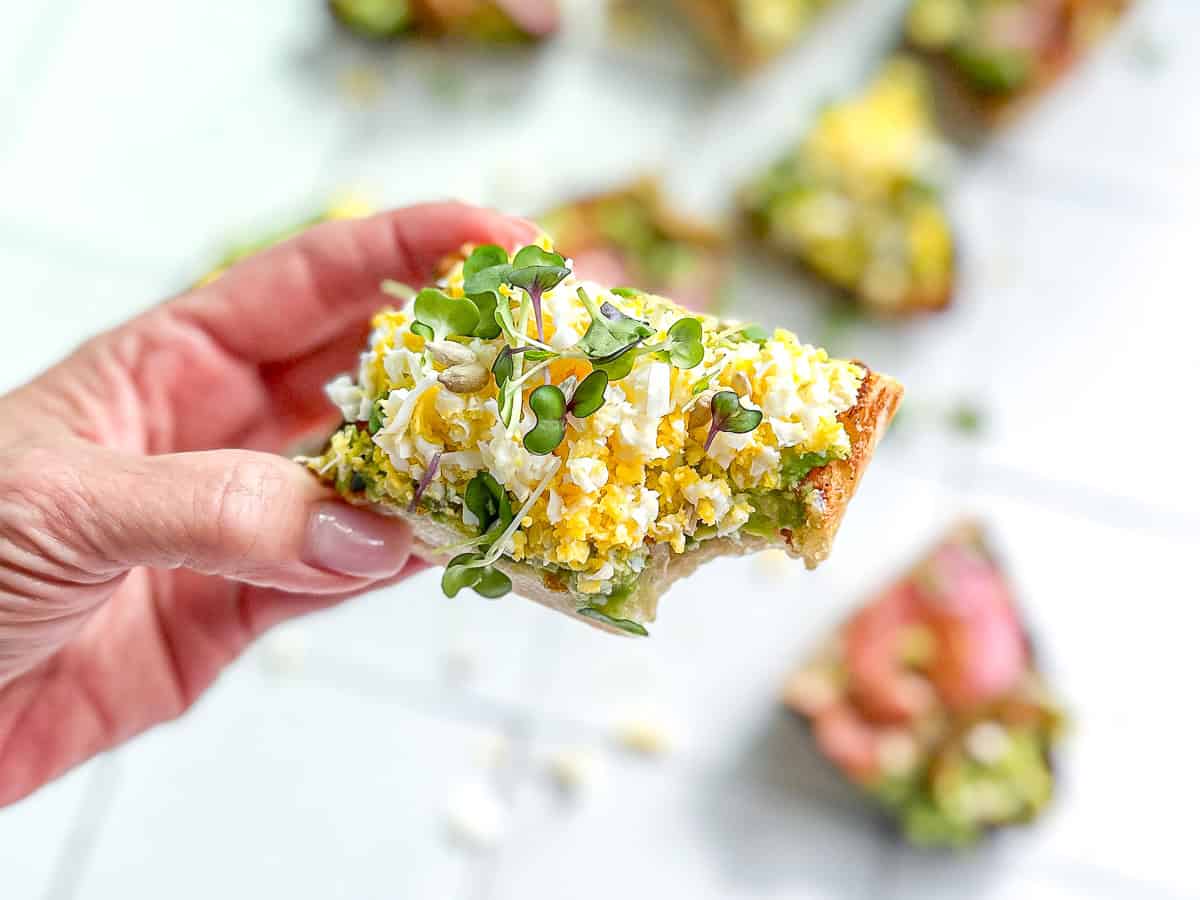
Method 1: Quick boil and cover

Step 1: Place eggs into the bottom of a pot in a single layer. Cover the eggs with cold water so that the water is at least 1 inch above the surface of the eggs. Cover the pot with a lid. Turn the heat to high and bring the water to a rolling boil. Remove the pan from the heat and keep covered.
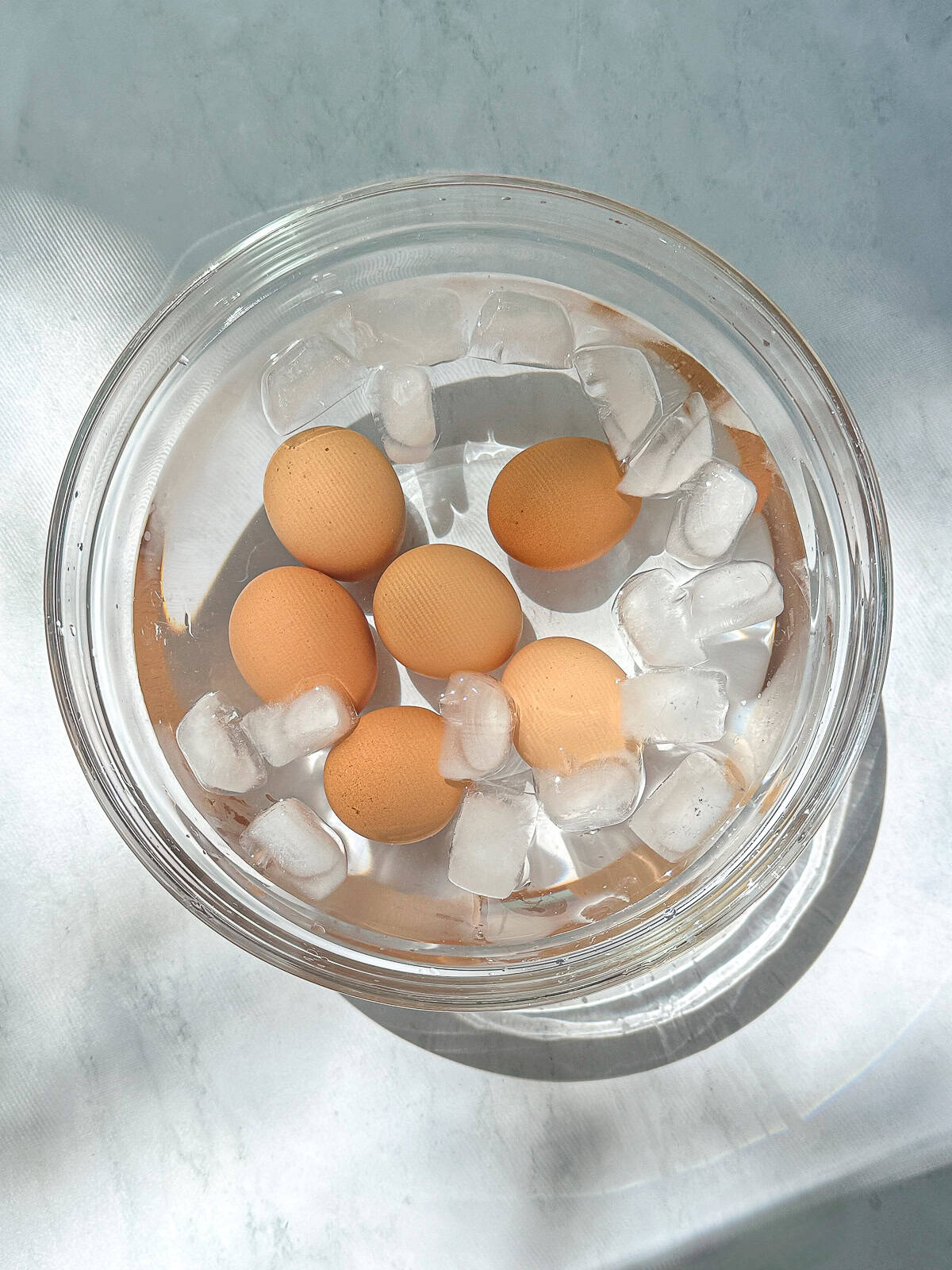
Step 2: Leave in the hot water for 10 minutes for medium and small eggs, 12 minutes for large eggs, and 15 minutes for extra large and jumbo eggs. Immediately remove the eggs from the hot water and place into a large bowl filled with ice water for at least 15 minutes.
Method 2: Steaming
Add a couple of inches of water to the bottom of your pot. Bring the water to a rolling boil and then add the steamer basket with your desired number of eggs.
Cover and steam your eggs for 12 minutes for medium and small eggs, 15 minutes for large eggs, and 16 minutes for extra large and jumbo eggs. Once the time has elapsed, transfer the eggs immediately to a bowl of ice water for at least 15 minutes.
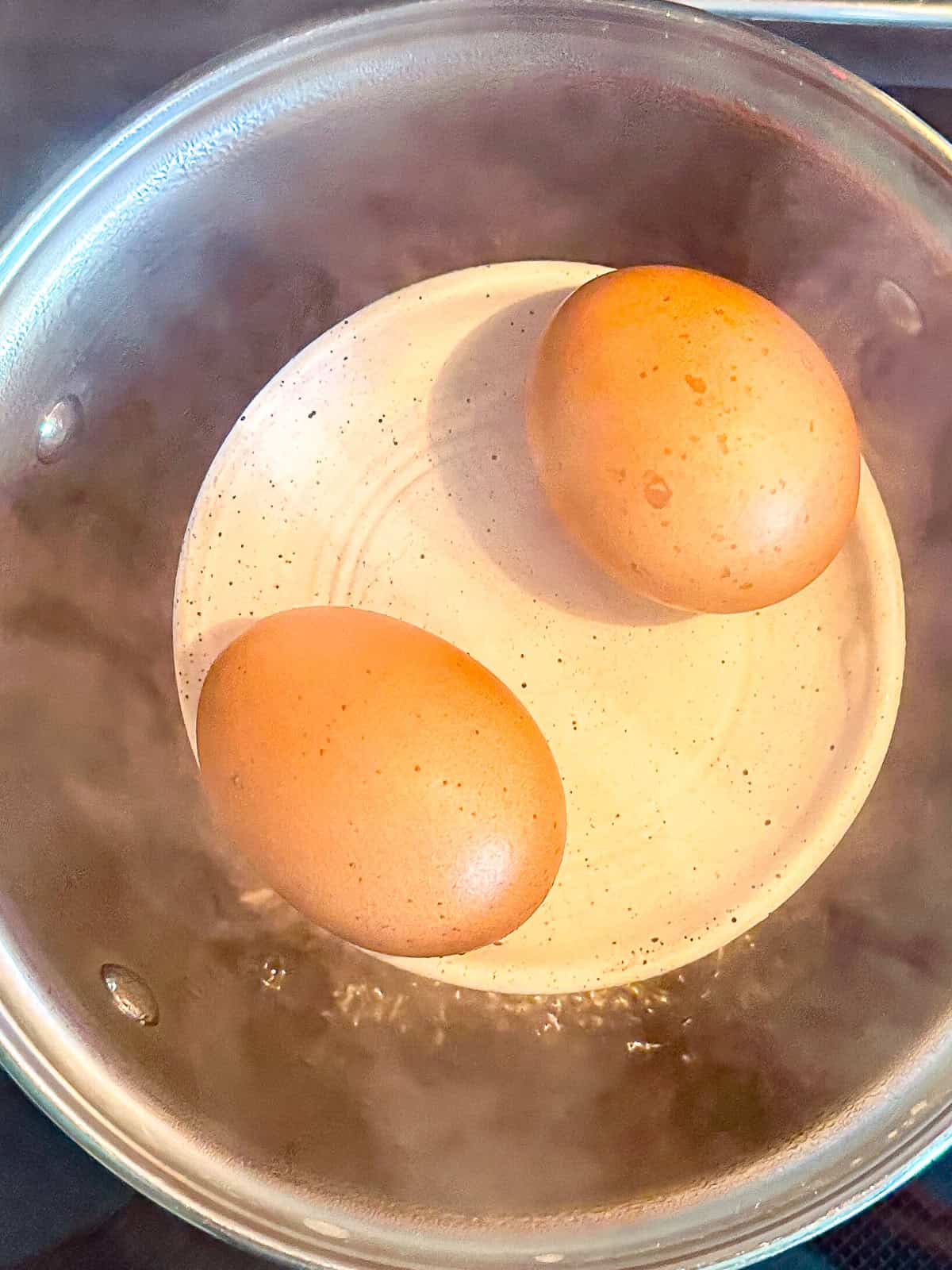
No basket: Crumple up 3 or 4 pieces of aluminum foil into balls and place into the bottom of your pot or saucepan and fill with water to cover the foil. Place a heat safe plate on top and bring to a boil.
Add your eggs, cover, and steam your eggs for 12 minutes for medium and small eggs, 15 minutes for large eggs, and 16 minutes for extra large and jumbo eggs. Once the time has elapsed, transfer the eggs immediately to a bowl of ice water for at least 15 minutes.
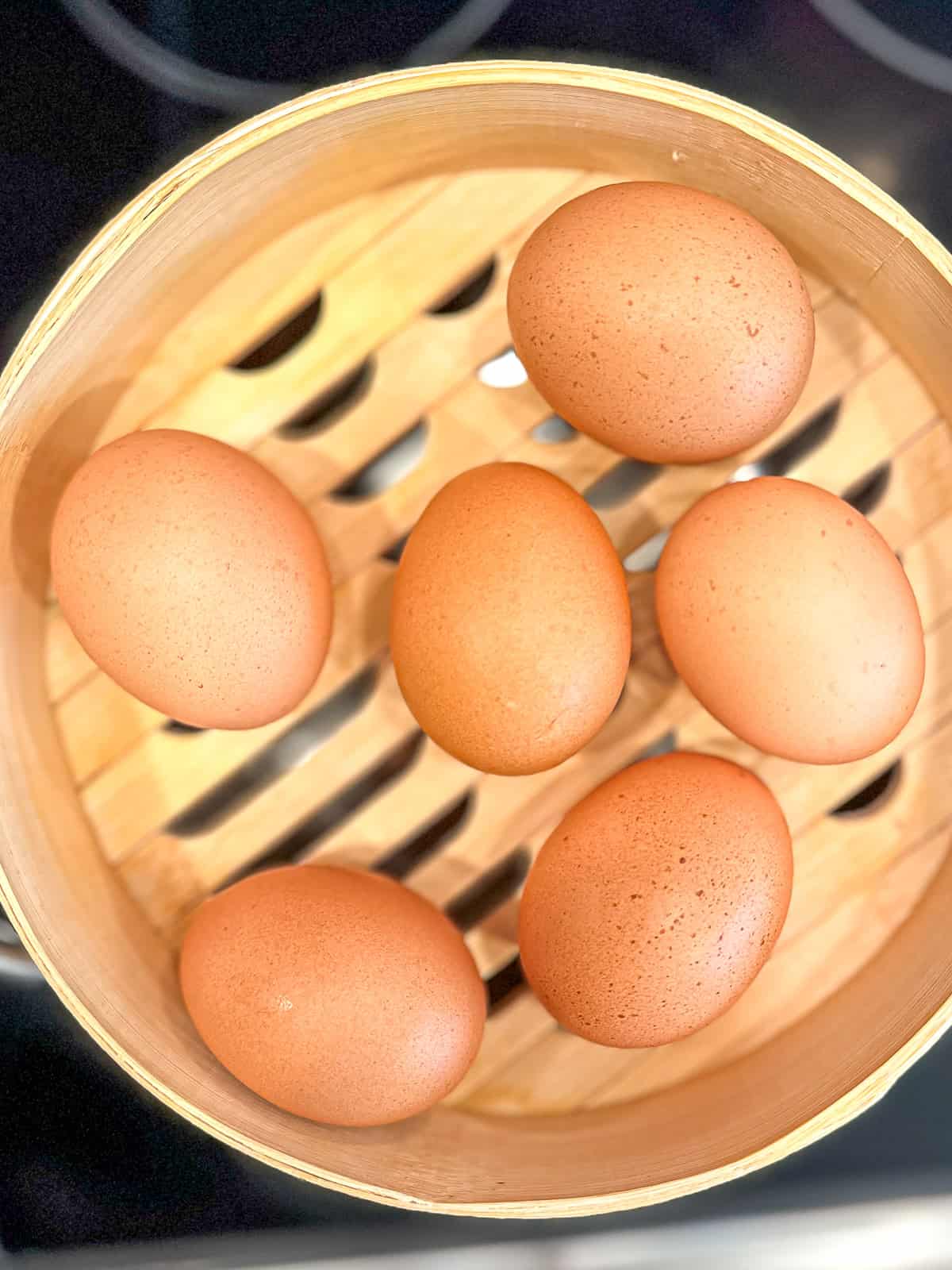
Bamboo basket: I don't just use my bamboo steamer for dumplings. I also use mine to steam tamales, fish, vegetables, and yes - even my eggs.
Fill your pot with a few inches of water, bring to a boil, pop on your steamer, add your eggs, and steam your eggs for 12 minutes for medium and small eggs, 15 minutes for large eggs, and 16 minutes for extra large and jumbo eggs. Once the time has elapsed, transfer the eggs immediately to a bowl of ice water for at least 15 minutes.
Rice cooker: Eggs can also be cooked using the steamer insert in your rice cooker. Add 2 cups of water to the inner pot. Place the desired amount of eggs into the steam tray, lower the steam tray into the inner pot then close the lid. Press the cook switch and set a timer for 10 minutes for jammy eggs and 13 minutes for hard boiled. Once the time has elapsed, transfer the eggs immediately to a bowl of ice water for at least 15 minutes.
Peeling your eggs
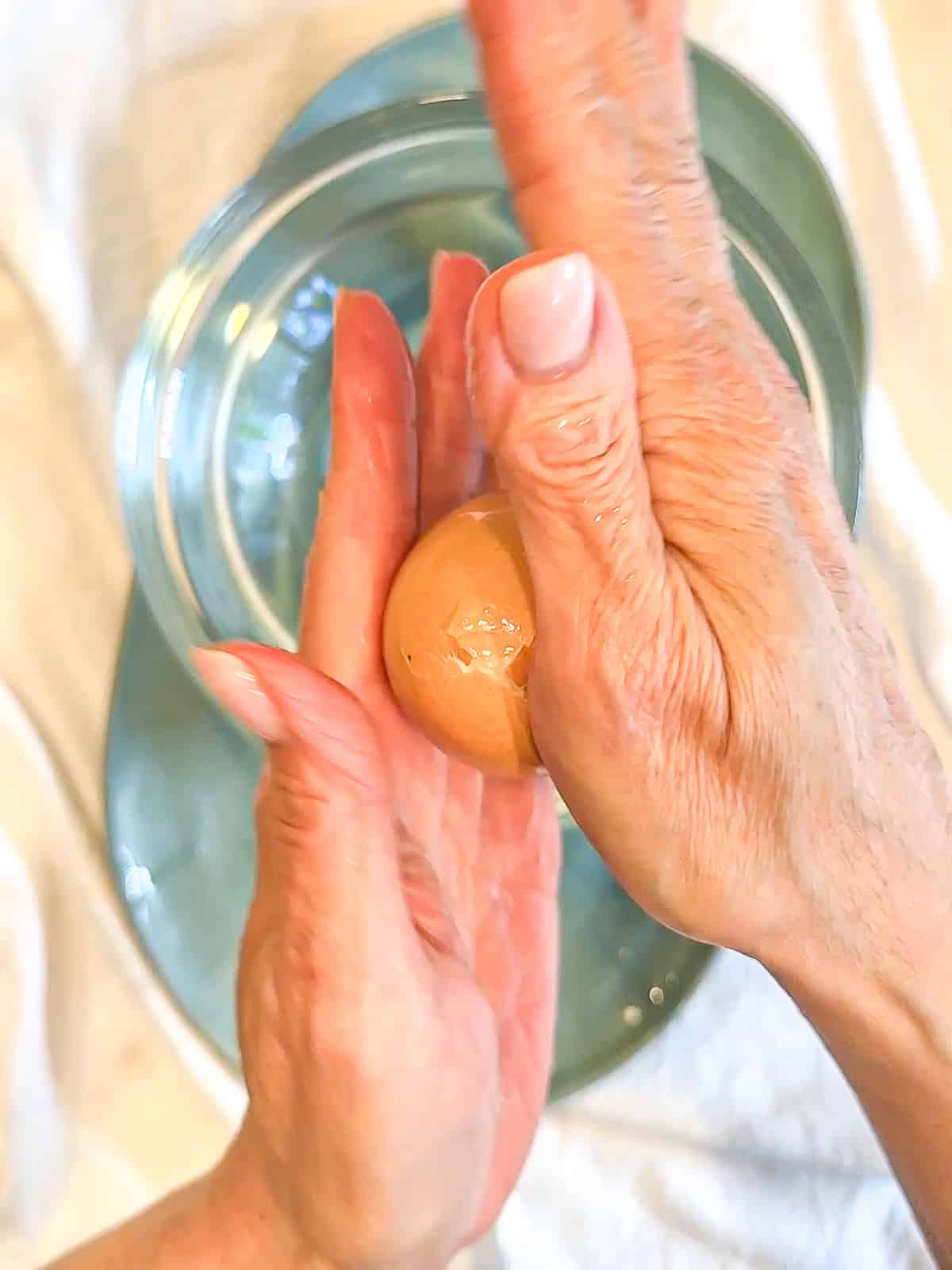
Step 3: To peel, tap the larger end of the egg on the counter to break the shell and roll between your hands to loosen and crack the shell all over. Put back in the water and let sit for a few minutes. This time will allow the water to seep between the egg and the shell membrane to loosen it.
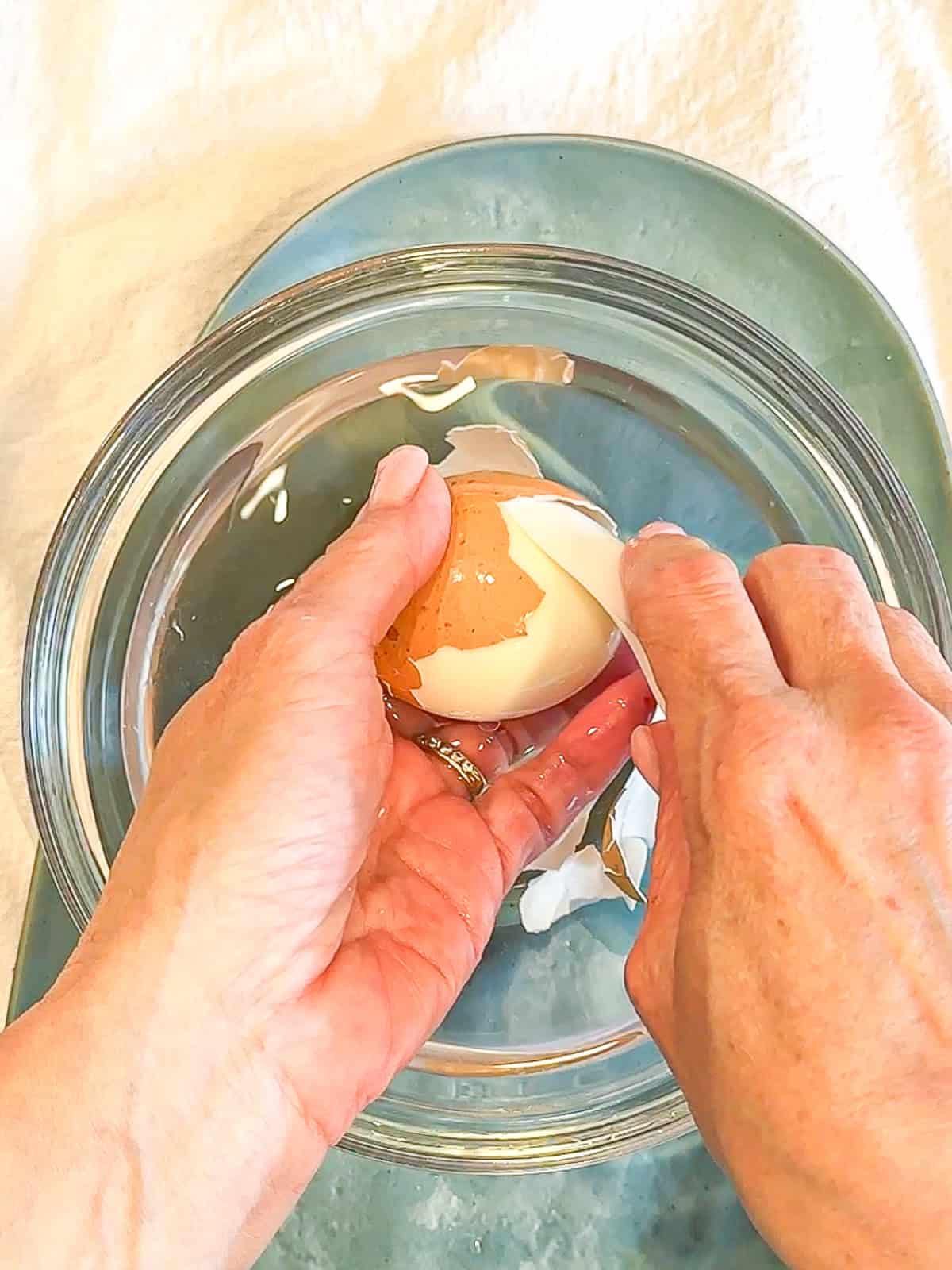
Step 4: Find an open spot on the bottom (larger end) of the egg and slip a spoon underneath, running it just along the surface of the egg and allowing the water to seep under the membrane. Let the curve of the spoon hug the curve of the egg and gently lift off the shell.
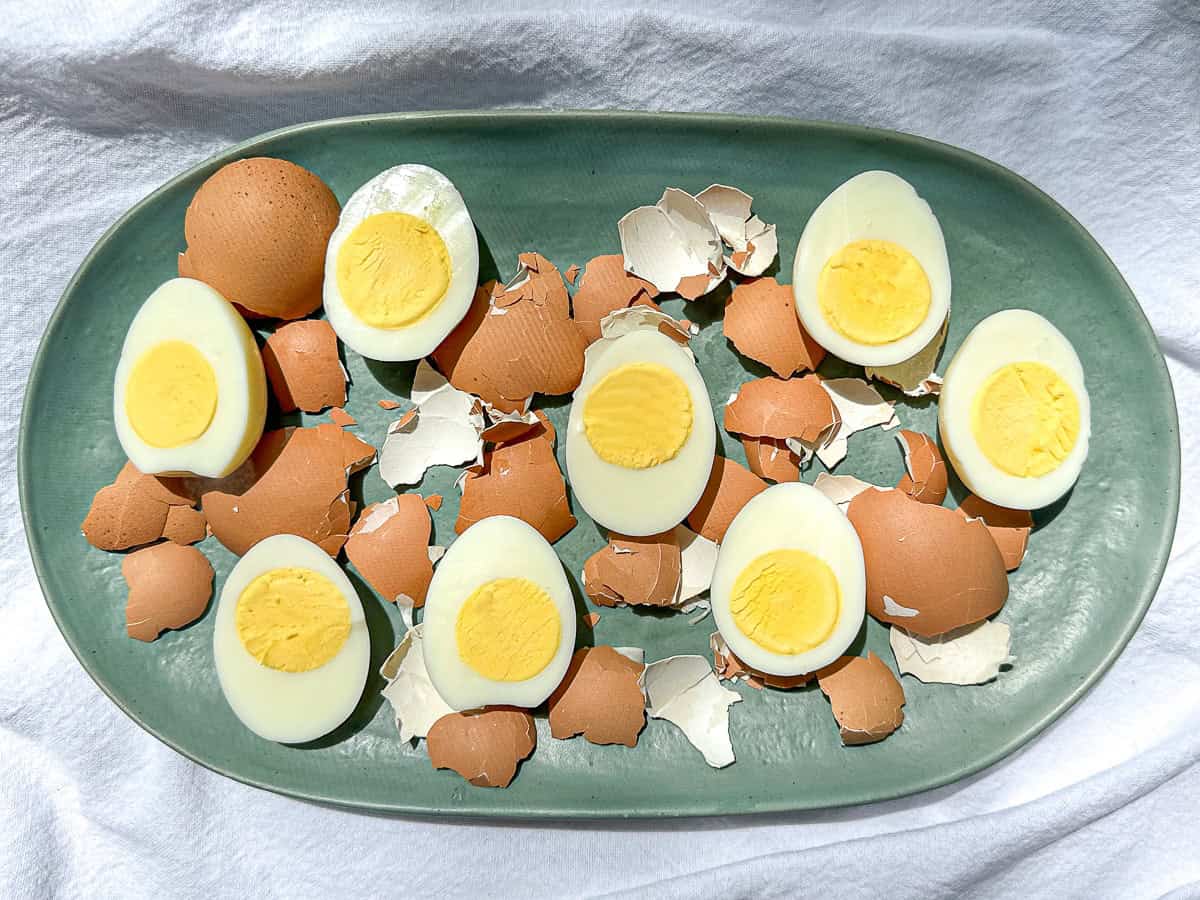
Eggs-pert tips
See what I did there?! 😂 Anyway, here are a few last minute egg tips for eggs-cellent eggs.
- Eggs that are about a week old or peel easier when using the boil and sit method. For steaming, any age egg will do. For both methods, I used straight from the fridge cold eggs.
- If you live at a high altitude, or more than 2000 feet above sea level, keep your eggs at a low simmer for 12 minutes. Add 1 minute of cooking time for every 1000 feet. At 10,000 feet, it takes about 20 minutes to boil an egg.
- If peeled, you can store these eggs in cold water for about 5 days if you change the water daily. 

Recipe FAQs
Almost every egg recipe will tell you to bring the water to a rolling boil. But what exactly is a "rolling boil". This occurs when the temperature of the water hits 212°F, or without a thermometer, when the water has vigorous bubbles that are constantly churning, breaking the surface, and splashing around.
Stored in the refrigerator, in an airtight container, unpeeled eggs are good for one week. If peeled, you can store these eggs submerged in an airtight container of cold water for 5 days, changing the water daily.
The gassy smell is actually hydrogen sulphide, which is a byproduct of overcooking your eggs. They are still edible and will taste fine, but the yolk will be a bit more crumbly. Just store the eggs in the most airtight a container you can. I like to double bag them and then place in a tupperware container. But don't worry, the odor will go away after you remove the eggs from the fridge.

Did you try this recipe?
Leave a comment with a ⭐️ rating below to tell me all about it, and don't forget to tag me on Instagram!
I appreciate you!
-Cynthia
📖 Recipe

Easy Hard Boiled Eggs (2 ways)
Equipment
- Steamer basket optional
- Bamboo steamer optional
- Rice cooker optional
Ingredients
- 4 Eggs or as many as you need
- Water
Instructions
Quick boil and cover method
- Place eggs into the bottom of a pot in a single layer. Cover the eggs with cold water so that the water is at least 1 inch above the surface of the eggs.
- Cover the pot with a lid. Turn the heat to high and bring the water to a rolling boil. Remove the pan from the heat and keep covered.
- Leave in the hot water for 10 minutes for medium and small eggs, 12 minutes for large eggs, and 15 minutes for extra large and jumbo eggs.
- After the appropriate amount of time, immediately remove the eggs from the hot water and place into a large bowl filled with ice water for at least 15 minutes.
Steaming method
- Add a couple of inches of water to the bottom of your pot and put in your steamer. Bring the water to a rolling boil and then add eggs to the steamer basket.
- Cover and steam your eggs for 12 minutes for medium and small eggs, 15 minutes for large eggs, and 16 minutes for extra large and jumbo eggs.
Steamer basket alternatives:
- No basket: Crumple up 3 or 4 pieces of aluminum foil into balls and place into the bottom of your pot or saucepan and fill with water to cover the foil. Place a heat safe plate on top and bring to a boil. Add your eggs, cover, and steam your eggs for 12 minutes for medium and small eggs, 15 minutes for large eggs, and 16 minutes for extra large and jumbo eggs. Once the time has elapsed, transfer the eggs immediately to a bowl of ice water for at least 15 minutes.
- Bamboo basket: Fill your pot with a few inches of water, bring to a boil, pop on your steamer, add your eggs, and steam your eggs for 12 minutes for medium and small eggs, 15 minutes for large eggs, and 16 minutes for extra large and jumbo eggs. Once the time has elapsed, transfer the eggs immediately to a bowl of ice water for at least 15 minutes.
- Rice cooker: Add 2 cups of water to the inner pot. Place the desired amount of eggs into the steam tray, lower the steam tray into the inner pot then close the lid. Press the cook switch and set a timer for 10 minutes for jammy eggs and 13 minutes for hard boiled. Once the time has elapsed, transfer the eggs immediately to a bowl of ice water for at least 15 minutes.
Peeling eggs
- Tap the larger end of the egg on the counter to break the shell. Roll gently between your hands to loosen and crack the shell all over. Put back in the water and let sit for a few minutes. This time will allow the water to seep between the egg and the shell membrane to loosen it.
- Find an open spot on the bottom (larger end) of the egg and slip a spoon underneath, running it just along the surface of the egg and allowing the water to seep under the membrane. Let the curve of the spoon hug the curve of the egg and gently lift off the shell.


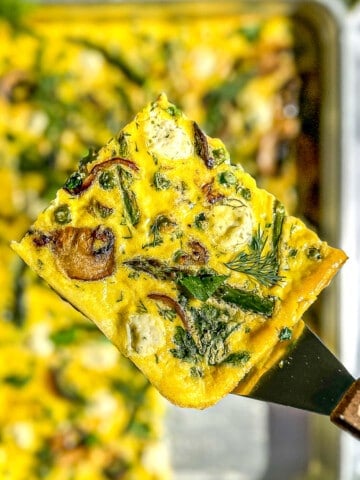
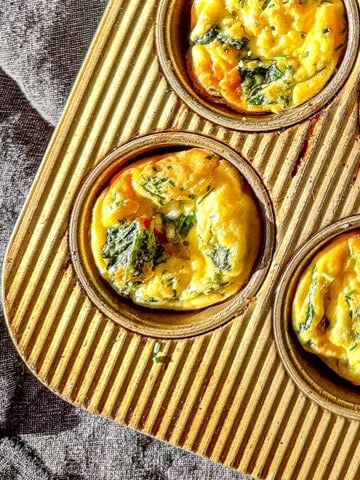
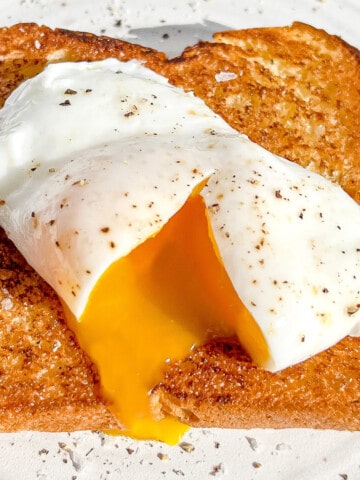


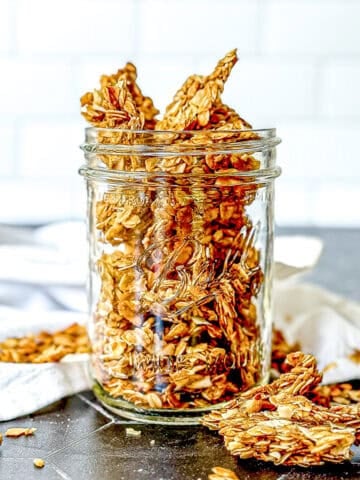

Comments
No Comments